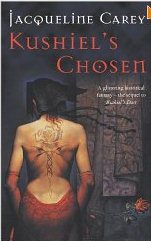Since this is a sequel to Kushiel’s Dart, there’ll be a few spoilers for the first book in the trilogy. I’ll try not to make them too glaring.
The book starts after the end of Kushiel’s Dart by about six months. Phèdre is now Comtesse of Montrève, and her sangoire velvet cloak – lost to her when she was sold into slavery in Skaldia – has been returned to her. Guessing that Melisande Shahrizai, responsible for that betrayal, has returned it as some sort of opening gambit in a game of intrigue, Phèdre decides to return to the service of Naamah in order to gain knowledge of where Melisande might be, and how she was helped to escape justice. Her return to the City of Elua also provides an opportunity to study Yeshuite writings to determine how she might free her friend Hyacinthe.
Joscelin Verreuil, her Cassiline companion and lover, is not at all happy about this return to prostitution, since he thinks her motivated by her feelings for Melisande, and he’s still very uncomfortable with the way Phèdre finds sexual pleasure in pain. He is much in sympathy with the young Yeshuites who chafe at their existence and want to set up their own state, north of Skaldia, and his relationship with Phèdre frays. Information brings Phèdre, Joscelin and her three chevaliers, Remy, Fortun and Ti-Philippe, to La Serenissima (Venice, by any other name) in search of Melisande, and things go horribly wrong.
As mentioned in my review of Kushiel’s Dart, I first read that book some years ago, and only recently have read the sequels. I wish now I’d read them earlier, because they are excellent and involving. There is a lot of intrigue in this book, very cleverly done, and Phèdre learns and deduces things as the reader does. Carey explores her world a little more, with her heroine ending up in Illyria (Croatia) and Kriti (Crete) before she’s able to return home to save the day again. The world-building is excellent, and nicely varied, and the people Phèdre meets in her adventures are realistic, with their own agendas and views. The prose is, as before, a little archaic-sounding (though with occasional stylistic lapses into a more modern idiom), and works well for this sweeping adventure.
Like Firefly, I thought that the absence of Joscelin from a large chunk of the book, and his fraying relationship with Phèdre was something of a shame, since he was one of my favourite characters from the earlier book. However, his absence was necessary for the plot to work; it’s just a shame that there’s so much squabbling and pain between them both. I think the narrative focus solely on Phèdre’s adventures in most of the second half of the book doesn’t always work.
One thing which I found interesting in Kushiel’s Chosen was the contrast between life in Terre d’Ange and La Serenissima. Women are less valued and have less power, they can’t inherit property (one of the reasons Marie-Celeste Stregazza is so angry with her father, Benedicte de la Courcel, for his second marriage, is that he plans to leave all his D’Angeline property, which his daughter could inherit, instead to his new son). Courtesans like Phèdre are not treated with the same respect, and homosexuality is frowned upon. Phèdre contrasts the appearance of the people she meets unfavourably with D’Angelines (though I think it’s more marked in the third in the trilogy), as in these remarks about Severio Stregazza, who is actually a second cousin of the Queen, Ysandre:
Severio Stregazza gave her an ungracious glance. I could not blame him for his anger and discomfort, in truth; in this, of all gatherings, his coarse curls and the ruder cast of his features showed clearly the dilution of Elua’s lineage, brought to La Serenissima in the person of Benedicte de la Courcel, great-uncle to Ysandre …
“Blood tells, though, here.” Severio shrugged. “Scions of Elua and his Companions!” He made a mockery of the words. “It means nothing, in La Serenissima. You can’t know what it’s like.”
p 77-78 (Kindle edition)
While Phèdre goes through many trials and ordeals, she remains a realistic and likeable character; a little irritating in her arguments with Joscelin, though that rings rather true. Her skill with languages stands her in good stead, since she finds herself having to learn Illyrian, and needing to speak Hellene. She’s an active agent in the plot, not ever languishing in a corner waiting for rescue.
I think you could probably read this without having previously read Kushiel’s Dart, but there’s so much backstory involved which Carey doesn’t explain in detail, that it would make much more sense to read the books in order. It’s not as involving as Kushiel’s Dart, but still exciting and well-written, and recommended.
Published by: Tor (2004)


Pingback: REVIEW: Kushiel’s Avatar – Jacqueline Carey | Ela's Book Blog